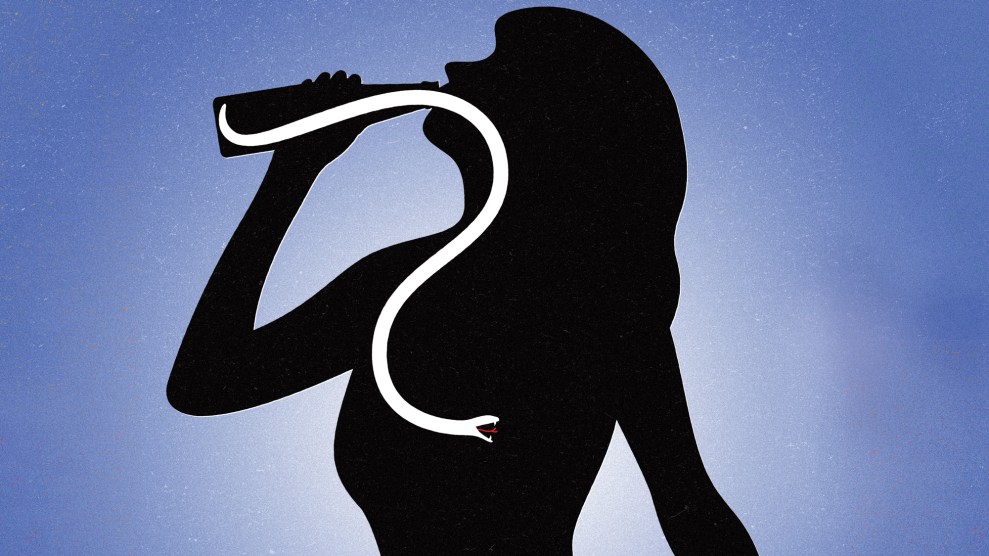
Kokouu/Getty Images
Ever since 1991, when Morley Safer raised a glass of red wine and told millions of 60 Minutes viewers that it might be a health elixir, Americans have taken it on faith that a nightly tipple is good for the ticker. The alcohol industry has helped perpetuate the notion, funding and promoting further studies claiming a host of other health benefits from moderate alcohol consumption—everything from lower rates of deafness to a prevention for dementia. But more recently, scientists have taken aim at a lot of those studies, finding their methodology deeply flawed and casting serious doubt as to whether alcohol really is some kind of miracle drug.
Now comes a huge study spearheaded by the UK’s University of Cambridge published in The Lancet this week. The study included dozens of researchers from around the world and nearly 600,000 drinkers in 19 countries. It finds that the people who consume more than one drink a day face greater risks of dying from any cause than those who drink less. The findings have implications for government health recommendations, which in many countries set limits that are much higher than the low-risk threshold found in The Lancet study.
In the US, the government says people who don’t already drink shouldn’t start. But for those who do, the US Department of Agriculture’s Dietary Guidelines recommend women limit their consumption to no more than one drink per day (98 grams per week) and men to two daily drinks (196 grams per week). The Cambridge study tried to assess how useful such guidelines really are based on the science behind them, and where the true bright line might be when it comes to figuring out relatively safe drinking limits. In an effort to avoid the problems that have plagued alcohol and health studies for decades, researchers only studied current drinkers, excluding abstainers or those who’d quit drinking. Abstainers and former drinkers are often much less healthy than those in the general population who drink moderately, but they’ve often been included in studies comparing drinkers to non-drinkers. What this means is that the results have been skewed and moderate drinkers have been made to look better than they probably should. The new study also excluded people with existing heart disease.
What it revealed was troubling: The people who drank more than 100 grams of alcohol a week had shorter lifespans than those who drank less than that. One hundred grams of alcohol translates into about five to six glasses of wine weekly, which is nearly double the US government’s recommended limits on alcohol for men. Those in the study who drank a lot more than that had significantly higher risks of dying from any cause, including heart disease, but even going from one daily drink to two raised heart disease and mortality risks significantly.
The differences at low levels of drinking were negligible, with only months of additional life expectancy at the bottom of the curve for a 40-year-old man or woman. But the study found a striking linear relationship between alcohol intake and dying from any cause. The researchers estimated that reducing long-term drinking from the two-drink a day limit suggested by the US government, to less than one a day, was associated with a one- to two-year boost in life expectancy in men.
Very light drinking seemed to have a small protective effect against non-fatal heart attacks. But drinking above 100 grams a week also kicked off much higher risk of stroke, heart failure, fatal aortic aneurysm, and disease from high blood pressure that could cancel out the benefits from lower heart attack risks. One reason, researchers speculated, is that drinking causes high blood pressure, a key risk factor for strokes. Duke University’s Dr. Dan Blazer, one of the study’s co-authors, said, “This study has shown that drinking alcohol at levels which were believed to be safe is actually linked with lower life expectancy and several adverse health outcomes.”
The findings dovetail with recent research showing that even low levels of alcohol raise the risk of cancer, particularly breast and colon cancer. And it raises further questions about why the federal government is currently recruiting subjects for a clinical trial, financed by the alcohol industry, to try to prove that alcohol prevents heart disease. Public health advocates have criticized the Moderate Alcohol and Cardiovascular Health (MACH15) study in part because starting in 2013, the National Institute on Alcohol Abuse and Alcoholism solicited donations from the world’s biggest alcohol producers, according to the New York Times, to fund the $100 million study—a project equal to a quarter of the agency’s annual budget.
Participants, a very limited group that excludes anyone under 50, anyone with a history of breast cancer, and a whole host of others—will be required to consume one drink a day for six years to see whether it will decrease their chances of getting heart disease compared to people who abstain. Virtually every researcher working on the study has ties to industry.
Richard Saitz, a professor of community health at Boston University School of Public Health, says that the new information reported in The Lancet raises further ethical questions about an industry-funded study that asks people to drink a substance known to cause cancer even at low levels. The US-government funded trial is “testing this amount [of alcohol] that appears to increase death,” he says.
If the MACH15 study produces an outcome favorable to the alcohol industry, Saitz and others believe it will be used by the industry to make health claims about its products even as more independent studies are consistently showing that people ought to be drinking less alcohol, not more.
















